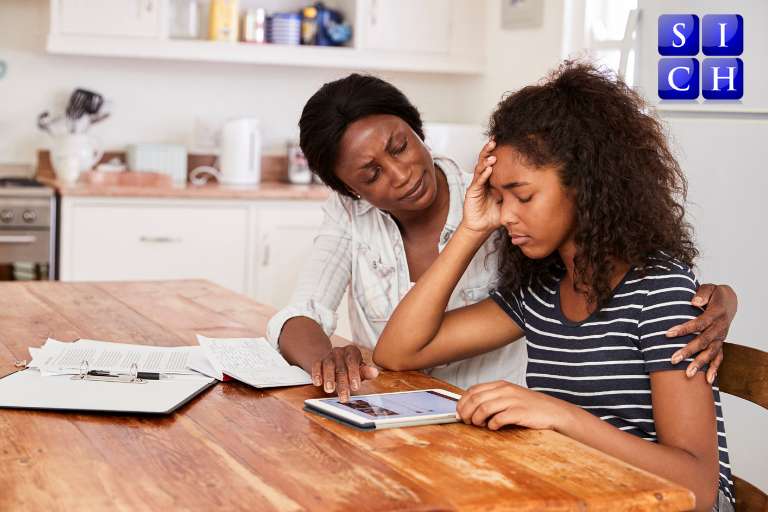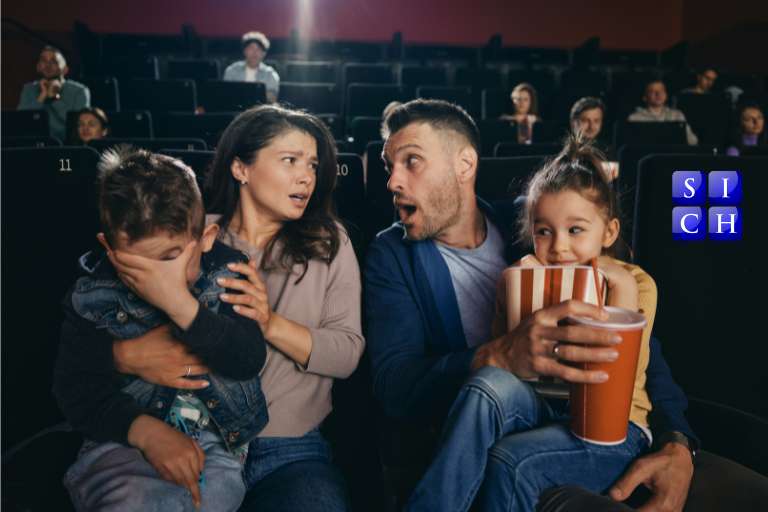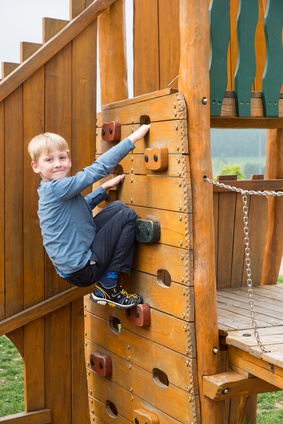Written by Paul White
Help children overcome anxiety because anxiety is tough for children. They don’t understand it, they don’t know why they ‘feel’ the way they do, and it gets worse, not better, even though everyone’s telling them it will be all right, it will get better.
All they understand is that now they are getting anxious about being anxious.
Parents always want to help children overcome anxiety and when they can’t they feel helpless and now the child (let’s call our child Johnny) is having problems eating and has missed school for several days because of upset stomachs and headaches.

You won’t be surprised if I tell you that what happens next is that Mum and Dad start to get anxious about Johnny missing school and, of course, Johnny notices Mum and Dad are anxious and that makes him even more anxious.
Table of Contents
The Role of Parents and Hypnotherapy
It’s what some people might call the ‘perfect storm’. I would prefer to call it ‘the perfect time for treatment’.
Is it possible to help children overcome anxiety? Yes and in most cases its highly effective. I am never surprised when children exceed my most optimistic expectations of a speedy recovery. They have an amazing resilience, brilliant imaginations, and seem a lot brighter, even younger than I can remember in my childhood.
They ask intelligent questions, they understand instantly the protocols of a treatment plan, and typically, there is no hidden agenda. They simply ‘want to get better’.
Some of the work we do as hypnotherapists can be helped greatly by parents. Parents can build the firm foundations on which we, as therapists, can construct a successful outcome but more of that later as we will show you how to help children overcome anxiety.
Parents understandably get a little caught up in the moment. They maybe get frustrated; they feel the best reassurance for Johnny is to suggest there is nothing to worry about, that this feeling will pass, it will be ok.
Of course, this advice is given with the best of intentions, but it’s not helping, for the simple reason that it’s not getting better. As we mentioned before, it is actually getting worse.
So How Do You Feel?
So here are a couple of important suggestions that will help children overcome anxiety by giving Johnny a clearer understanding of what is happening, why it’s happening, and how it will go away, just as quickly as it came in the first place.
You might have asked Johnny, “How do you feel?”
This is absolutely the right question, but what you most probably didn’t anticipate is that this time, it really is what you meant, how do you feel? Because anxiety is a feeling.
Now usually, when we ask someone how they feel, they say “fine” if they are well, or maybe in Johnny’s case, he will say, “I don’t feel well, I feel anxious.”
This is your cue to seek from Johnny some details. Words such as “I understand that you’re anxious, but what exactly feels wrong?” would be far more useful.
With anxiety, we would expect symptoms such as,
- Stomach upset
- Light headedness
- Headaches
- Breathlessness
- Dizziness
- Feelings of fear
- Increased heartbeat
We can check with Johnny to see if he might be feeling some of these.
Just recognising that these symptoms are exactly what you would expect with anxiety can help children overcome anxiety by reassuring them that their feelings are understood.
Time To Normalise The Anxiety
Understanding and Normalising Anxiety in Children
Reassuring children that anxiety is a common experience for both adults and children can be highly effective. Anxiety can arise in everyday situations, such as starting a new school, beginning a new job, or attending a job interview. Normalising these feelings helps children recognise that what they are experiencing is natural.
Sometimes, anxiety appears without an obvious reason. A child may not be aware of what triggered their anxious feelings, making it more confusing and distressing. Understanding that anxiety can be triggered subconsciously is key to helping children overcome it.

A Simple Way to Explain Anxiety
One of the best ways to help children understand anxiety is through relatable examples.
A useful way to illustrate anxiety is by asking, Have you ever watched a scary film on TV or in the cinema, especially one with eerie music and a sudden shock, like a ghost appearing or a murderer stepping out from behind a curtain?
Most children will say yes and may even laugh nervously at the memory. You can then point out, That was an anxious moment, but notice that you’re laughing about it now. Why do you think that is?
The answer is simple, it was just a film.
How the Subconscious Brain Triggers Anxiety
In therapy, watching something is called visual stimulation. Everything we see is processed by the subconscious brain before we are even aware of it. That is why, when driving, we instinctively hit the brakes when someone steps into the road before we even process the danger consciously.
The subconscious mind is excellent at fast reactions and keeping us safe. It doesn’t analyse situations, it simply responds.
Why the Brain Reacts to Fear
When something scary happens on a cinema screen, the subconscious mind perceives it as a real threat and activates a physical response. This is often referred to as the fight or flight response.
However, I prefer not to use this term, as it can be misleading. For example, someone who is afraid of spiders doesn’t necessarily want to fight them or run away, they may simply step out of the room.
Instead, it is more useful to explain that the subconscious mind, when detecting danger, releases adrenaline, increases heart rate, and changes breathing patterns to prepare the body for action.

How Conscious Awareness Can Reduce Anxiety
Returning to the cinema example, when we feel anxious, our brain instinctively looks for a reason: Why do I feel this way?
In the cinema, the answer is obvious: The film is scary.
This is why we can laugh about it later, or even return to watch the sequel, knowing that the fear is not real. Once the conscious brain recognises there is no real danger, anxiety disappears, and we return to normal.
So What Does Johnny Learn
Helping children understand this process can make a huge difference in how they perceive anxiety. By showing them that fear is sometimes triggered by subconscious processes, we can help them separate real danger from imagined threats and guide them toward overcoming anxiety more effectively.
This simple example teaches Johnny something very important,
- Anxiety is common
- Both adults and children experience it
- Your subconscious mind can make you feel anxious even when there is no real threat, like in the cinema
- Your conscious mind can bring calmness by correctly identifying why you feel anxious
- Some people even enjoy feeling scared, as long as they understand the fear is based on imagination rather than real danger
One Other Key Insight
The physical symptoms of anxiety and excitement are identical.
For example, take Father Christmas. Many children experience mixed feelings, excitement and anxiety, because they’re wondering, will Santa come, will he bring the present I want?
Once a child stops believing in Santa, they often feel pure excitement rather than anxiety. Why? Because they now know for sure that Mum and Dad have bought their gifts, and there is no uncertainty.
Understanding this concept can help children overcome anxiety by shifting their interpretation of anxious feelings.
How Anxiety Develops
Anxiety can also be learned. Here are three key ways this happens,
- Learning from others
- If a parent always screams when they see a spider, their child is more likely to develop the same fear.
- Physical anxiety responses
- If someone has a panic attack after taking a stimulant like caffeine or medication, they may develop an ongoing fear of those symptoms, even when they haven’t taken anything.
- Accumulated stress leading to anxiety
- Sometimes, anxiety builds up over time due to multiple stressful events. A child might appear to be coping, but one seemingly small incident could push them into anxiety overload.
Examples of stressors that can contribute to anxiety,
- Moving house
- Parental separation
- Illness in the family
- Witnessing an accident
- Exams and school pressure
- Bullying
- Changing schools
- Loss of a loved one
- Social media pressures
- Puberty related changes
By recognising these factors, parents and therapists can work together to help children overcome anxiety and guide them towards emotional resilience.
Always remember that what we as adults may consider trivial, a child may view as catastrophic.
The accumulation may result in anxiety being experienced by a child as triggered by what may appear as a minor ‘blip’, for example, missing a bus. But, of course, it is the accumulation of the other issues that are the real cause of the anxiety, which then brings us on to the concept of misinterpretation.
This concept is straightforwardly a result of our conscious awareness (cognitive processes) looking for an explanation of why we feel the way we do, and usually picking the most obvious reason.
Bizarrely, our cognitive mind often then tries to confirm its opinion by actually quite deliberately placing us in that same situation, to test the theory. Often, this makes things worse because we then have a conscious and subconscious unity, which is a powerful mixture.

The Mind Commands – The Body Obeys
You may have heard the expression ‘the mind commands and the body obeys’. This is often true if you know how to make the command. Unfortunately not everyone does.
An awareness of the nature and strategy of anxiety, an understanding of the conscious and subconscious mind, gives all parents a great start in building those foundations we mentioned earlier.
Your belief, and that belief expressed confidently to your child, that anxiety is simply treatable, that it’s a common problem and that relief of what is a difficult and unpleasant experience is speedy and long-lasting, will be a strong reassurance to your child. This simple act alone will help children overcome anxiety.
Physical Symptoms of Anxiety
- Vomit
- Dry mouth
- Blurred vision
- Dizziness
- Sweating
- Palpitations
- Difficulty talking
- Fainting
- Breathing problems
- Blushing/face or body
- Confusion
- Tight muscles and tensions (head/neck/shoulders)
- Headaches
- Tummy upset (butterflies)
Paul White is a qualified paediatric hypnotherapist accredited by The Canadian Institute of Hypnotism. He has a special interest in children’s behavioural problems including:- anxiety, eating problems, school attendance and bedwetting. For ove 20 years his primary focus was to help children overcome anxiety.
